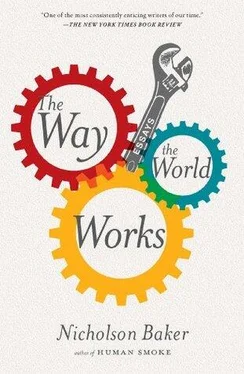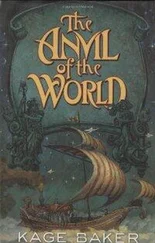Sometimes, though, I have a very different sort of ambition. I want to write a short book called The Way the World Works. I want it to be a book for children and adults, that explains everything about history, beauty, wickedness, invention, the meaning of life. The whole unseemly, bulging ball of wax. One of those books that Dover Books reissues, retaining the original typography, like On Growth and Form. I get this ambition most powerfully when I have the feeling I have right now, that everything is simple. I know it isn’t really simple, and I know I’ll never write the book, but still, I sense that I’m on the verge of understanding the rules, the laws, the sleights of hand, that govern every human action. I know why people are angry, why they laugh, why they sue other people, why they wear certain kinds of hats, why they get fat, why they say the things they do — or I almost know it. Another half an hour of frowningly careful thought and I will have it figured out. Why am I the lucky one who almost knows all this? It’s because I did some patient research into a few forgotten areas. I filled out the call slips and summoned the acid-free boxes stuffed with archival folders. I half mastered several isolated turf-squares of history, and I know a little about my own lived world as well, and with these several stake-points to steady me, I can pitch my moral tent.
The feeling will pass; in fact it’s already passing. But that’s all right. One’s head is finite. You pour more and more things into it — surnames, chronologies, affiliations — and it packs them away in its tunnels, and eventually you find that you have a book about something that you publish. Then you can forget most of the details — eject them, clean those warrens out, make room for more. And once in a while, as on a perfect morning such as this, you’ll have the rapturous illusion that everything you know adds up.
(2004)
The essays in this book first appeared in the following publications, sometimes under different titles.
Periodicals
The American Scholar: “String,” “Narrow Ruled,” “No Step,” “I Said to Myself,” and “Mowing.”
Areté: “The Nod.”
Columbia Journalism Review: “Defoe, Truthteller.”
Duke University Libraries: “If Libraries Don’t Do It, Who Will?”
Granta: “La Mer.”
Harper’s Magazine: “Why I’m a Pacifist.”
Literaturen: “Sunday at the Dump” (in German translation).
Married Woman: “How I Met My Wife.”
McSweeney’s , “ San Francisco Panorama ” issue: “Papermakers.”
The New Yorker: “Coins,” “Truckin’ for the Future,” “Grab Me a Gondola,” “Kindle 2,” “Steve Jobs,” and “Painkiller Deathstreak.”
The New York Review of Books: “The Charms of Wikipedia.”
The New York Times: “The Times in 1951.”
The New York Times Book Review: “From A to Zyxt,” “Sex and the City (Circa 1840),” and “Google’s Earth.”
NYRblog: “We Don’t Know the Language We Don’t Know.”
Papers of the Bibliographical Society of America: “Reading the Paper.”
Port: “David Remnick.”
The Washington Post Magazine: “One Summer.”
Books
“Inky Burden,” preface to A Book of Books, by Abelardo Morell.
“Take a Look at This Airship!” introduction to The World on Sunday, by Nicholson Baker and Margaret Brentano.
“Thorin Son of Thráin,” in The Most Wonderful Books: Writers on Discovering the Pleasures of Reading, edited by Michael Dorris and Emilie Buchwald.
“What Happened on April 29, 1994,” in 240 Ecrivains Racontent une Journée du Monde: l’Album Anniversaire: 1964–1994, edited by Le Nouvel Observateur (in French translation).
“Why I Like the Telephone,” in Once upon a Telephone: An Illustrated Social History, by Ellen Stock Stern and Emily Gwathmey.
“Writing Wearing Earplugs,” in How I Write: The Secret Lives Of Authors, edited by Dan Crowe with Philip Oltermann.

© ELIAS BAKER
Nicholson Baker was born in 1957 and grew up in Rochester, New York. He studied at the Eastman School of Music and Haverford College. He has published nine novels, the latest of which is House of Holes, and four previous works of nonfiction. His work has appeared in Best American Short Stories and Best American Essays . A nonfiction work, Double Fold, won a National Book Critics Circle Award. He lives with his family in Maine.













